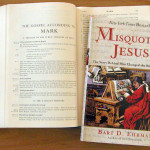Violence is Contrary to God’s Nature: Common Ground for Catholics and Atheists
by Dr. Matthew Ramage
Filed under Christianity and Violence, The Bible
Today I’d like to consider an issue on which many atheists and Catholics may—perhaps to their surprise—find a point of common ground. “Violence is incompatible with the nature of God.” This line is not from an atheist but rather from Pope Benedict XVI. The context in which he penned it was his famous (in some circles infamous) Regensburg Address from 2006. In this particular case, he was endeavoring to foster a dialogue with Islam over a theology which “might even lead to the image of a capricious God, who is not even bound to truth and goodness.”
As good Muslims and atheists whom I’ve known in the past have indicated, this warning applies to Christian theology and Scripture as well. Namely, what do we make of the many Old Testament texts in which God commands seemingly evil deeds such as the slaughter of men, women, and children? For just one example, read 1 Samuel 15. Within this chapter, God commands the extermination of an entire people and then proceeds to remove King Saul for office for not having fully carried it out!
Before I proceed any further, I want to make something clear. Within the constraints of a short blog post, I have no pretense of offering an exhaustive defense of the many passages in the Bible which seem to fly in the face of the words just cited from our previous pope. In fact, I have recently authored a 300-page book entitled Dark Passages of the Bible that itself only scratches the surface of this issue. What I hope to achieve here is simply to make an observation which I hope will better frame debate over the Bible’s so-called dark passages, as well as to offer a key principle for explaining their presence from a Catholic perspective—a perspective which, unfortunately, not many Catholics themselves grasp and hence are unable to convey to non-Christians.
To begin, the very notion of violence being contrary to God’s nature is something we Catholics debate amongst ourselves. Thomas Aquinas, for example, seeks to justify violent divine actions in the Old Testament on the basis of the fact that all people are sinners and in fact deserve the punishment of death on account of original sin. Hence Aquinas states, “[B]y the command of God, death can be inflicted on any man, guilty or innocent, without any injustice whatever.” For Augustine as for Aquinas, the problem of thinking God is being cruel when killing people is that we just don’t realize the gravity and pervasiveness of sin and thus the punishment it deserves. Now I love both of these Doctors of the Church, and this is a very brief paraphrase of their arguments, but here I have to join my atheist friends in saying that I simply don’t fully buy the explanation. To be sure, it’s not the only possible Christian answer, but other ones I have come across usually leave me just as unsatisfied. So my observation is this: if even I—a Catholic theologian who buys fully into the Catholic worldview and tradition—don’t find this approach satisfying, then I don’t think we are going to make progress in our dialogue with atheists by taking an approach wherein we seem to have no problem in saying that God directly wills the killing of men, women, and children. Perhaps God does do this. I am open to being convinced otherwise, but again I just don’t buy it.
That said, I am fairly certain that my response is not going to satisfy atheists, either. Yet I do think it makes a step in the right direction by at least admitting that they have a point in seeing the Old Testament’s dark passages as problematic from a certain point of view. So what does the Catholic have to offer the atheist by way of explanation, then?
First, for Pope Benedict with whom I agree, we have first have to admit that the Bible really says what it seems to be saying. It says God did some violent things.
Second, we may admit that what the Bible says does indeed seem to conflict with the nature of God such as we understand it through reason.
Third—and here is the key according to Pope Benedict—the Catholic has to interpret the entire Old Testament as a gradual progression towards Jesus Christ: “Anyone who wishes to understand the biblical belief in God must follow its historical development from its origins with the patriarchs of Israel right up to the last books of the New Testament.” Christians believe the fullness of truth is revealed in the person, teaching, and ministry of Jesus. We look at the entirety of Scripture in light of him. Indeed, according to Pope Benedict, problematic passages in the Old Testament are “valid insofar as they are part of the history leading up to Christ.” Now if he had commanded violence, then we’d be in trouble. (Perhaps you have an objection here, but that’s a topic for another post).
Benedict’s 2010 exhortation Verbum Domini is particularly significant because it has a section entitled “Dark Passages of the Bible” in which he states that instances of violence and immorality in the Bible can be adequately addressed only if Catholics take seriously the fact that “God’s plan is manifested progressively and it is accomplished slowly, in successive stages and despite human resistance.” Benedict admits that “revelation is suited to the cultural and moral level of distant times,” and for this reason the Bible narrates certain things without denouncing their immorality in the way that we would rightly do today. In an interview Benedict stated in the same vein: “It follows straightaway that neither the criterion of inspiration nor that of infallibility can be applied mechanically. It is quite impossible to pick out one single sentence [of the Bible] and say, right, you find this sentence in God’s great book, so it must simply be true in itself.”
Bottom line: the Old Testament does not give us a video-camera account or transcript of what God said and did in times of old. It is God’s word; it is inspired; it is inerrant (Due to space constraints I’m not addressing that issue here, although it definitely needs addressed). Neither I nor Pope Benedict nor anyone who takes such a position need deny these Catholic doctrines. But interpreting passages which seem to contradict the nature of God requires us to recognize that the people who penned the Old Testament were not privy to the fullness of divine revelation and the Catholic tradition whereby we now distinguish, for example, between God’s active will and his permissive will (whereby he allows evil to be done by humans).
Did the authors of the Old Testament think that God wanted them to execute entire peoples? To me it seems disingenuous to reply in the negative. Yet notwithstanding that these authors thought, for Catholicism and its doctrine of biblical inerrancy the question revolves around what they intended to assert or teach, as stated in Vatican II’s constitution Dei Verbum. But I digress. The simplest way to say it is that the Old Testament’s conception of God and God’s deeds was imperfect because God was working with an imperfect people to gradually lead them to Christ. Like any good teacher, God in his divine pedagogy had to work the pupils he had, not the 4.0-GPA honors students he wished he had! The imperfections we see in the Old Testament are therefore not God’s, but rather due to the fact that he deigned to “condescend” (to use a term from the Church Fathers) and patiently work with a truly human people to lead them into communion with himself. I suppose God could have “zapped” people’s minds and taught them the Trinity ten thousand years ago, but in the Catholic worldview this is not the way we understand God typically acts. He creates a human nature and works with it. As the scholastics aptly said, grace builds on nature. Problematic passages within Scripture are among the clearest of evidence that grace does not eliminate human nature.
Like I said above, I don’t expect an atheist to be convinced by this. First of all, it’s an incredibly abbreviated summary covering only one of several key distinctions needed to account for the Bible’s dark passages. Second, to accept the divine pedagogy is already to have accepted something prior to it: namely, the existence of God and faith in Jesus Christ. Seeing Old Testament passages in light of their progression towards Jesus is only going to satisfy someone who already believes that Jesus is God in the flesh. But it’s not my job in this post to prove that Jesus is God or even that God exists. What I’ve tried to do is the only thing a Christian can do in this situation, according to Thomas Aquinas. That job is to provide answers to objections from unbelievers so that they might see what a reasonable way to deal with dark biblical passages might look like if faith in Christ and his revealed word is granted.
Related Posts
Note: Our goal is to cultivate serious and respectful dialogue. While it's OK to disagree—even encouraged!—any snarky, offensive, or off-topic comments will be deleted. Before commenting please read the Commenting Rules and Tips. If you're having trouble commenting, read the Commenting Instructions.













